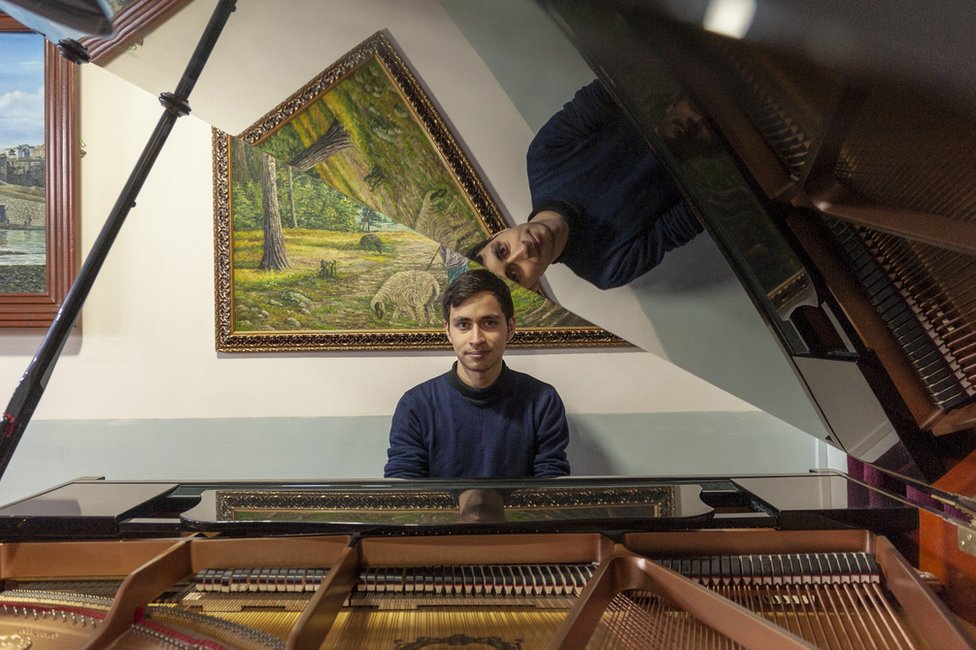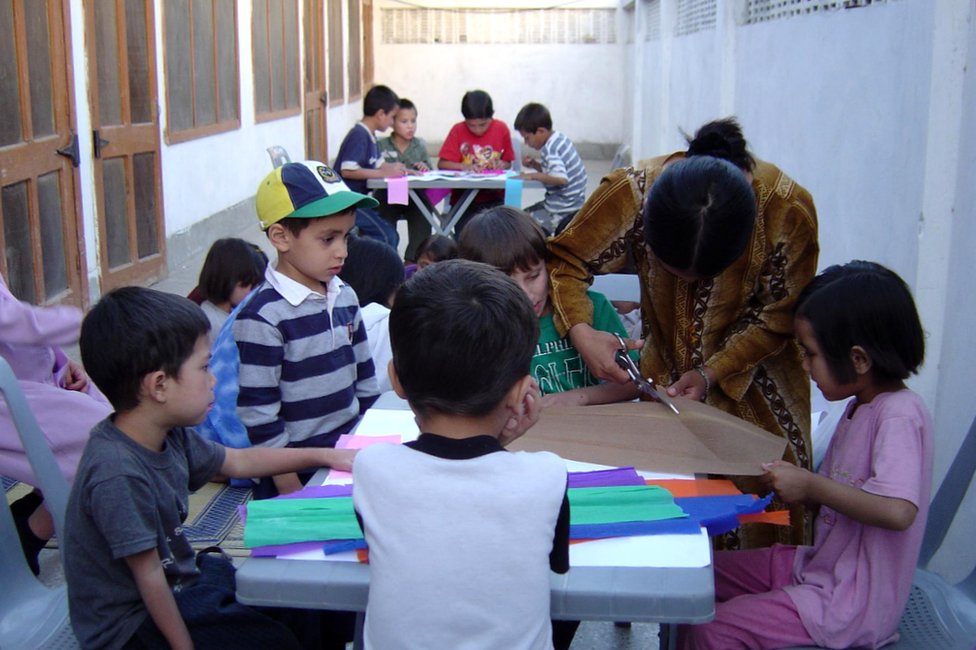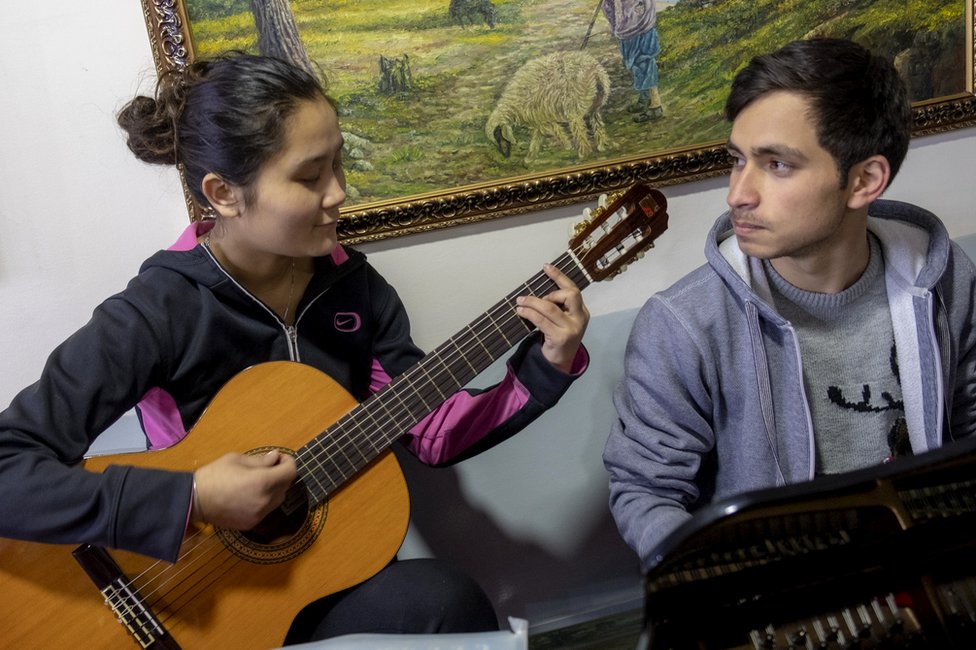
Fahim was living at the time in an orphanage for Afghan refugee children in Pakistan. He walked into a room one day where children and staff were watching the film, and on screen a hungry and terrified Polish Jew was playing the piano for a German officer - playing for his life.
"What I saw captivated me," Fahim recalled. "I went to bed every night with the image in my head. I remember thinking, 'Wow, how could a piano and the sound of it save someone's life?'"
Fahim, who is 20 now, was born a refugee. His first home was a mud hut in a camp for Afghan displaced people in what is now Khyber Pakhtunkhwa province in Pakistan. His parents met and fell in love in the camp after fleeing the civil war in Afghanistan before the Taliban took power in the 1990s.
When Fahim was three years old, his parents sent him to a home for poor children and orphans, about 150km (90 miles) from the camp. Fahim's mother didn't have a job and his father worked as a teacher in the camp. They could not afford anything for their son. They hoped he would get a good education at the orphanage.
In the years after he saw The Pianist - the film tells the true story of Holocaust survivor Wladyslav Szpilman - Fahim filled his head with thoughts of playing.
"All those years, I dreamed that one day I could touch a real piano and make beautiful sounds from it," he said.

Then in 2012, Fahim's parents decided to return to Afghanistan with Fahim and his sister. They wanted the children to grow up in their homeland. The family settled in the capital Kabul, where both Fahim's parents found jobs as teachers. One day later that year, Fahim was at a children's learning centre in the city.
"From behind a closed door of a room came this wonderful sound - someone was playing a beautiful piece of music on the piano," he said. "I knew I should not go in uninvited, but couldn't help myself."
The teacher, Mr Milad, was giving a lesson, but he let Fahim walk up to the baby grand piano.
"I gently touched it and pressed every single key, for the first time in my life," Fahim said. "From that moment, I knew I had to learn piano. I had to become a musician."
Fahim learned that the piece he had heard and fallen in love with was by Polish composer Frederic Chopin. Later he would learn that the music in that fateful scene in The Pianist was also written by Chopin - Nocturne number 20 in C sharp minor. It was the piece Wladyslav Szpilman had played to save his real life.
Fahim took his first piano lesson that day.
Before long, he learned that Afghanistan had a National Institute of Music - founded in 2010 by Dr Ahmad Sarmast, with international support, to bring music education to disadvantaged children. It offered courses both in Afghan and Western music.
Fahim applied for a place at the institute to study piano and composition. He was overjoyed when he was accepted, he said, but his parents were apprehensive.
"My parents told me I would not be able to get a job if I studied music," he said. "It took me a long time to persuade them to let me do it. They feared that my life would be in danger for taking up music and playing a Western instrument. They are still worried about it now."

During Taliban rule in Afghanistan from 1996-2001 music was banned. And nearly two decades after the Taliban was removed from power by US-led forces, the group still exerts influence in most areas of Afghanistan and is increasing its strength and control.
Two years after Fahim joined the music school, a suicide bomber targeted a student concert there, killing one person in the audience. The school founder, Dr Sarmast, was at the event and was severely injured. Fahim had planned to attend the concert to show support for his fellow students, but was ill that day.
"I was lucky. But I didn't feel scared afterwards," he said. "I would often stay behind after classes to practise the piano, alone in the entire campus, for hours. I know there is always a risk, but I am prepared to take it for my music study."
Fahim cannot buy a piano to practise on at home. "It is impossible," he said. "Even if one has money."
Last year, a foreign diplomat gave him an electronic keyboard when he left the country. "But I can only practise at home a little because there are power cuts all the time," Fahim said.
He has been invited to perform at concerts and cultural exchange events in the region. He also plays his own compositions dedicated to people killed in the ongoing conflict in Afghanistan. The South Asian Symphony Foundation has selected him as its ambassador for peace.
In 2015, Fahim joined thousands of people marching through the streets of Kabul demanding justice for Farkhunda Malikzada, a 27-year-old woman who was beaten to death by a mob after she was falsely accused of burning the Koran. The incident shocked the country and made headlines around the world. Her killing had a huge impact on Fahim.
"I was so shocked and angry. I realised how backward Afghanistan was and how much we have to do to pull ourselves ahead," he said. "I decided to compose a piece in her memory. It took me eight months to complete 'Farkhunda'. I poured my emotions into it more than any other composition I wrote."
On the first anniversary of Malikzada's death, Fahim and other music students gathered at the place where she was killed and played the piece for her.
Another composition that has made Fahim known in Afghanistan is Freedom, a piece for piano in honour of Afghan reporters who have lost their lives in the violence. He wrote the piece in 2018, one of the deadliest years for the press in the country, with at least 17 journalists killed.
"A reporter is someone who works for our freedom. Journalists are my heroes. Through my music, I want to show my support to them and raise my voice against those who try to take our freedom," Fahim said.
Fahim hopes to go to the United States in 2021. He has been offered a scholarship to study piano performance at the Longy School of Music in Cambridge, Massachusetts. His favourite piece is still Chopin's Nocturne number 20 in C sharp minor. From time to time, he still watches The Pianist.

You may also be interest in
"Scene" - Google News
December 25, 2020 at 07:02AM
https://ift.tt/2KRGxmf
A scene in The Pianist changed Arson Fahim's life - BBC News
"Scene" - Google News
https://ift.tt/36mRPVq
Shoes Man Tutorial
Pos News Update
Meme Update
Korean Entertainment News
Japan News Update
No comments:
Post a Comment